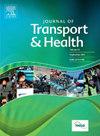Missing the bus: Impacts of loss of bus services on the wellbeing of older adults
IF 3.2
3区 工程技术
Q2 PUBLIC, ENVIRONMENTAL & OCCUPATIONAL HEALTH
引用次数: 0
Abstract
Background
For many people, buses play a crucial role in connecting them with friends and family, and to opportunities such as employment, education, retail, leisure, and healthcare.
During autumn 2023 sections of the North East region of England endured seven weeks without usual bus services due to industrial action. This study explores the impact of the loss of bus services on older adults living in the borough of Gateshead.
Methods
Qualitative interviews with 15 older adults (aged 50–82 years) living in Gateshead explored their experiences of loss of bus services. Analysis of interview transcripts used an inductive approach to develop themes.
Results
Four main themes were identified: a shrinking world, striking at the heart of life, an unequal impact, and buses as a lifeline. The loss of bus services meant people could not reach their usual range of destinations, travelled less often, and felt a sense of entrapment in their homes. They missed healthcare appointments, social interactions, and were restricted to more localised services. People experienced a loss of freedom, independence, and control over their lives. The impacts fell disproportionately on people with existing social or economic disadvantages.
Conclusions
Older people described harmful consequences for their physical, mental, and social wellbeing. Impacts were unequally distributed and exacerbated underlying inequalities. Buses play a vital role in supporting health and wellbeing, enabling independence, and addressing inequalities. This research adds evidence for transport policymakers to support the social wellbeing case for improving public transport.
错过公共汽车:失去公共汽车服务对老年人健康的影响
对于许多人来说,公共汽车在与朋友和家人联系以及获得就业、教育、零售、休闲和医疗保健等机会方面发挥着至关重要的作用。在2023年秋季,由于工业行动,英格兰东北部部分地区连续七周没有正常的公共汽车服务。这项研究探讨了失去公共汽车服务对生活在盖茨黑德市的老年人的影响。方法对生活在盖茨黑德的15名老年人(50-82岁)进行定性访谈,探讨他们失去公共汽车服务的经历。对采访记录的分析使用归纳的方法来发展主题。结果确定了四个主题:一个缩小的世界,打击生活的核心,不平等的影响,公共汽车作为生命线。公共汽车服务的中断意味着人们无法到达通常的目的地范围,出行次数减少,并且有一种被困在家中的感觉。他们错过了医疗预约、社交互动,而且只能享受更本地化的服务。人们失去了自由、独立和对生活的掌控。目前处于社会或经济不利地位的人受到的影响不成比例。结论:人们描述了对他们身体、精神和社会健康的有害后果。影响分布不均,加剧了根本的不平等。公共汽车在支持健康和福祉、实现独立以及解决不平等问题方面发挥着至关重要的作用。这项研究为交通政策制定者提供了支持改善公共交通的社会福利案例的证据。
本文章由计算机程序翻译,如有差异,请以英文原文为准。
求助全文
约1分钟内获得全文
求助全文

 求助内容:
求助内容: 应助结果提醒方式:
应助结果提醒方式:


